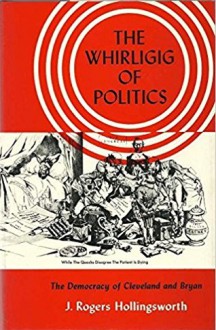The Whirligig of Politics: The Democracy of Cleveland and Bryan
By 1893 the Democrats controlled Congress and the White House simultaneously for the first time since the Civil War. Yet the next eleven years saw defeat after defeat, until the United States Senate was almost emptied of northern Democrats, the House held a divided minority, and a Democratic...
show more
By 1893 the Democrats controlled Congress and the White House simultaneously for the first time since the Civil War. Yet the next eleven years saw defeat after defeat, until the United States Senate was almost emptied of northern Democrats, the House held a divided minority, and a Democratic governor north of the Mason and Dixon line had become a rarity. Why the Democratic party fell into such a sad state of affairs is a major concern of this book.
Mr. Hollingsworth's lucid history of the Democratic party for these years demonstrates how national tensions were reflected in party division and how party leaders were at times unwittingly responsible for the nation's conflicts. As a result, nearly every major problem confronting the American people was fought out within the Democratic party.
The Democratic decline, the author contends, can be largely attributed to the party's failure to choose coalition leaders capable of conciliating differences both within the party and in the nation. Focusing on the struggles between the Cleveland and Bryan factions, the author demonstrates how the inflexible leadership of Cleveland and Bryan intensified internal unrest.
The Whirligig of Politics highlights the perennial dilemma of party politics: whether to cling to principles at the expense of unity and victory or to tread the path of compromise. The book is therefore as important for political scientists as for historians.
show less
Format: hardcover
ISBN:
9780226349626 (0226349624)
Publish date: 1963-12-01
Publisher: University of Chicago Press
Pages no: 263
Edition language: English

Joseph Rogers Hollingsworth's book is an examination of the leadership of the Democratic Party from Grover Cleveland's triumph in 1892 through a succession of electoral defeats leading up their disastrous collapse in the 1904 election. Hollingsworth sees the inability of successive party leaders to ...

